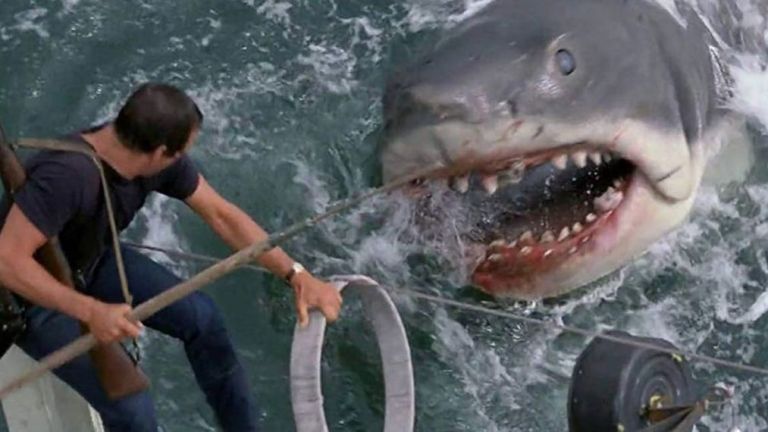The Negative Legacy of Jaws Continues in All Shark Movies
Jaws is one of the greatest summer movies of all time, but the genre it inspired triggered tragic consequences for the real world.

No study of film is complete without the inclusion of the shark. Cinema has long told stories of man’s eternal battle with monsters, real or otherwise. Yet over the decades, no animal has endured so thoroughly as that on-screen nemesis like the humble shark. There’s always time for a shark movie, including this summer with the release of Ben Wheatley’s Meg 2. Indeed, our very (mis)understanding of the creature is rooted in its movie history. Film has an incredible ability to reimagine the world around us, but its eternal insistence on turning the shark into a merciless killing machine for midnight movie scares has left a permanent, major scar. And it’s almost entirely thanks to one movie that not only changed Hollywood forever but left sharks with a serious case of bad PR.
Jaws has a lot to answer for.
Prior to the film that changed everything, shark movies were infrequent but still participating in the post-King Kong monster boom that quickly became the stuff of B-movie double feature staples. There were titles like White Death, which was about a real-life adventurer’s daring efforts to catch a shark off the coast of Queensland, and 1956’s The Sharkfighters, one lightly inspired by true events with its depiction of U.S. Navy scientists working to create an effective shark repellent for soldiers lost at sea. They were never as popular as aliens or Godzillas, partly because they couldn’t stand up to the foreboding threat of a creature that could make its way onto land.
These movies also exposed a key reason for why shark films didn’t compete with their land counterparts: Special effects couldn’t yet capture the true fear of the real thing, and attempts to cultivate that energy on camera in the wild might result in death, as it did for one crew member during the production. It’s ironic that when they finally cracked the code on the shark film, it would be with one of the most notoriously fake-looking animals in movie history.
Overstating the cultural impact of Jaws is near-impossible. To say Steven Spielberg invented the concept of the summer blockbuster is an understatement of his achievements. He remade the New Hollywood era with only his third feature film, adapting the novel by Peter Benchley into a decades long phenomenon, and all at the ripe old age of 29. Shot on the ocean, the movie infamously faced major production setbacks, particularly the unavoidable problem of the malfunctioning mechanical sharks built to strike fear into the hearts of the audience.
To overcome this problem, Spielberg spent more time building up the shark’s might than actively showing it, punctuated by that iconic John Williams score. To this day, Jaws still inspires screams and remains one of the all-time great thrillers. The battle of man versus shark as portrayed in Jaws is primal, one of human grudges and the uncaring force of the wild. It’s essentially Moby-Dick in terms of how it shows the men’s obsessive fervor in destroying something that is driven only by the whims of nature. Is there a more terrifying enemy to humanity than one that has no agenda behind its malice?
Once it became literally the most successful film of all-time (until Star Wars took over), Jaws of course inspired a slew of copycats. Sharks were in, but so was the entire concept of terror on the open seas. Dino De Laurentiis wanted to one-up the shark movie so he made Orca, a surprisingly solid thriller (if obvious rip-off) featuring a vengeful killer whale. Roger Corman and Joe Dante cashed in with Piranha, a more comedy-oriented monster tale with a proudly schlocky approach to the story of mutated cannibalistic fish wreaking havoc on a local resort. But it was sharks that reigned supreme over the waters of Hollywood and beyond, with multiple increasingly silly Jaws sequels leading the way.
We could be here all day listing shark movies, from Deep Blue Sea to The Shallows and Open Water, to the myriad Syfy and Tubi originals featuring sharknados, sharktopi, ghost sharks, ice sharks, trailer park sharks, and too many others to count. Consider that Meg 2: The Trench, the sequel to a knowingly ridiculous action movie about a megalodon shark with a penchant for destruction. Wheatley’s movie continues to imitate shark movies of the past while simultaneously hoping to join their sharp-toothed ranks. Storytellers return to the shark for very basic reasons, and not all of them are because they want some of that sweet Jaws aura. These countless films are all thoroughly aping from Spielberg’s mold, and reinforcing the ideas it created about sharks as a whole. Sharks are unstoppable, vengeful, anti-human, and ready to wreck your life, so the stories go.
You don’t need to know much about sharks to look at them and be terrified. They’re inherently unnerving creatures in their appearance, with a lineage that stretches back to the Jurassic era. They’re apex predators, proudly soaring atop the food chain and reaching sizes of up to 40 feet in length. Sharks have multiple rows of sharp teeth, can reach speeds of 12 miles per hour, and have brain-to-body mass ratios that are similar to mammals and birds, which suggests that some breeds have the ability to learn through observation. Because sharks were so mysterious for so long, it became easy to build up vast and near-mystical lore about them, and they’re frequent features of Hawai’ian and Pacific Island mythology. Their image is that of the king of the ocean, a being of might and fury that will reign victorious over all who enter its path, and Hollywood has certainly strengthened that image.
Many shark films thus position these animals as figures of vengeance. Jaws: The Revenge (easily the worst of the Jaws sequels) has a shark wreaking vengeance on the Brody family of the first film, positioning this animal as the John Wick of the ocean, imbued with generational trauma and a hunger to stalk a family thousands of miles to fulfil its duty. Such motivations don’t tend to offer much narrative satisfaction when the antagonist is a non-verbal animal who can’t go beyond the beach. Sharks are familiar figures in this animal-driven revenge plot, for no conceivable reason beyond the admittedly freaky idea of being on the receiving end of its grudge.
Unfortunately, what this all means is that the legacy of the shark film is fraught with ecologically damaging after-effects. In an interview with BBC Radio from 2022, Spielberg said he deeply regretted the decimation of the world’s shark population over the decades following Jaws‘ release. He felt that it was partly his fault, saying, “I still fear … that sharks are somehow mad at me for the feeding frenzy of crazy sword fishermen that happened after 1975. I really, truly regret that.”
Benchley also expressed concern over the novel’s impact on the animals and later became a staunch advocate for sea mammal conservation. In a 2000 interview, he said, “What I now know, which wasn’t known when I wrote Jaws, is that there is no such thing as a rogue shark which develops a taste for human flesh.” The numbers certainly don’t ease either of their worries. According to a study published by Nature, the worldwide population of sharks and stingrays declined by more than 71 percent between 1970 and 2018. In 2021, the International Union for Conservation of Nature said 37 percent of sharks and stingrays are at risk of extinction.
Jaws is also frequently blamed for the dramatic rise in trophy hunting of sharks and sea mammals. The movie spearheaded what was described as a “collective testosterone rush” among fishers on the American East Coast, as George Burgess, former director of the Florida Program for Shark Research, told the BBC in 2015.
He said, “It was good blue collar fishing. You didn’t have to have a fancy boat or gear—an average Joe could catch big fish, and there was no remorse, since there was this mindset that they were man-killers.” Research by biologist Dr. Julia Baum suggested that between 1986 and 2000 in the Northwest Atlantic Ocean, there was a population decline of 89 percent in hammerhead sharks, 79 percent in great white sharks and 65 percent in tiger sharks.
There is less urgency to protect an animal with such a terrible reputation. Humans are more likely to support cute animals, even if they’re dangerous, such as the astonishingly scary hippopotamus. It’s also evident among sea mammals, where dolphins and orcas are seen as the cuddly BFFs of man despite the former being known to assault humans and the latter currently planning to overthrow our entire species. Statistically speaking, you’re far more likely to be killed by a toaster than a shark. Hell, the teeth on your jeans’ zipper is more dangerous than the great white minding its own business.
It’s tough to overcome basic human instinct. We see sharp teeth and we freak out, we reach for our weapons, and we make an enemy for life. There’s also the indomitable desire to reign over all, whether they populate the land, air, or sea. Killing a shark, and making it seem justifiable to do so, is badass to many, but only in this absurd, macho context. It’s less alluring when done for shark’s fin soups. But there have been major efforts over the past few decades to preserve and protect the world’s shark population.
With the negative attention brought to the species by Jaws came some positive support too. There was a surge in scientific interest in the animals, as well as general affection from many. However, the struggle against the combined forces of climate change, overfishing, trophy hunters, and good old-fashioned human fear is a mighty one. Many species of sharks remain endangered. Their reputations have never truly recovered post-Jaws. They probably never will, and it’s not as though cinema is eager to offer them a belated rehabilitation.
Pop culture likes to return to well-worn material to mine the most basic primal urges for easy satisfaction whenever possible. Sharks will always be king of the non-cryptid monster movies for that very reason, even if such demonizing has done them no favors in real life. So, don’t be too surprised if they join the orcas in the inevitable uprising against us humans. We kind of deserve it.
